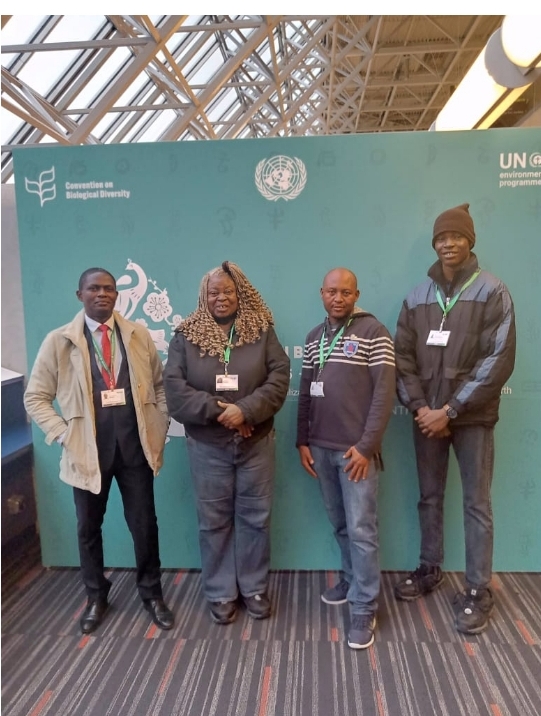By Edel-Quinn Agbaegbu

Here in Montreal Canada, at the venue of the UN Biodiversity Conference, (Palais des Congrès de Montréal). we all witnessed the adoption of the Global Biodiversity Framework, (GBF) as “Nations Adopt 4 Goals and 23 Targets for 2030 in a UN Biodiversity Agreement” to halt the destruction of the Earth’s ecosystems. Prominent in the agreement is the target to protect 30% of the planet for nature and restore 30% of the planet’s degraded terrestrial, inland water, coastal and marine ecosystems by the end of the decade in 2030. This is referred to as “Target 30 by 30” and serves as the main theme for the GBF.
This agreement was negotiated by delegates from about 196 countries across the globe from 3 -19 December, 2022. Some of these were delegates from Every Woman Hope Centre (EWHC), an international Non-Governmental Organization with strength in advocacy and capacity building. They were led by Ms. Edel-Quinn Ijeoma Agbaegbu, as leader of the delegation to the 2022 UN Biodiversity Conference.
The historic once-in-a-decade deal, came at the early hours of December 19, 2022, at about 3:30am in a plenary session that lasted for about 7 hours. Remarkably, there were objections from some African countries such as, Democratic Republic of Congo (DRC), the home of the world’s second-largest Rainforest, Cameroon and Uganda, as negotiators from these countries pushed for the creation of a new biodiversity fund to support the new conservation targets.
This last-minute intervention by DRC was dismissed, apparently on technicality bases by the COP 15 President and China’s Minister of Environment, Huang Runqiu. As such, the decision in the final agreement was to create a new fund within the Global Environment Fund (GEF), which is UN’s existing financing mechanism; and commit to future discussions on separate fund. Although the rich countries nevertheless, agreed to provide $30bn of aid for biodiversity by the end of the decade, some are wondering if this is an artful negotiation tactics!
However, progress was made in efforts to change the tide of environmental destruction and ensure a peaceful coexistence between nature and people. It is a positive response to previous scientific warnings that unhealthy human activities are leading to the start of the earth’s sixth mass extinction. The Canadian Minister of Environment, Steven Guilbeault, defined the agreement as a bold-step forward to protect nature. Although the agreement is not legally binding, Parties are expected to reflect these targets and goals in their national development plans as indicators to demonstrate progress in meeting relevant protocols and agreements to safeguard biodiversity on earth.
This has become necessary due to the fact that global consumerism is growing on daily bases at an unprecedented pace and has exposed the world to great
challenges at the cost of the environment. The accelerating pace of climate change due to unhealthy human behavior towards nature, combined with increasing global population and depletion of biodiversity resources are threats to the environment and natural resources. They have posed many risks, including disasters to humans and all forms of life on earth, as well as the biodiversity. This circumstance has put nature’s vital contribution to humanity in jeopardy and constitutes major threats to existence and needed urgent actions.
These were captured in the remarks of the United Nations Secretary-General, Antonio Guterres, during the COP 15 opening ceremony on December 6, 2022, where he stated that;
“Nature is humanity’s best friend. Without nature we have nothing. Without nature we are nothing. Nature is our life support system. It is the source and sustainer of the air we breathe, the food we eat, the energy we use, the jobs and the economic activity we count on, the species that enrich the human life, and the landscape and waterscapes we call home. Yet, humanity seems hellbent on destruction. ….. “With our bottomless appetite for unchecked and unequal economic growth, humanity has become a weapon of mass extinction. We are treating nature as a toilet and ultimately, we are committing suicide by proxy, because the loss of nature and biodiversity comes with a steep human cost. …. We must fix the world we have. We must cherish this wonderous gift. We must make peace with nature. I urge you to do the right thing. Step up for nature. Step up for biodiversity. Step up for humanity”.
challenges at the cost of the environment. The accelerating pace of climate change due to unhealthy human behavior towards nature, combined with increasing global population and depletion of biodiversity resources are threats to the environment and natural resources. They have posed many risks, including disasters to humans and all forms of life on earth, as well as the biodiversity. This circumstance has put nature’s vital contribution to humanity in jeopardy and constitutes major threats to existence and needed urgent actions.
These were captured in the remarks of the United Nations Secretary-General, Antonio Guterres, during the COP 15 opening ceremony on December 6, 2022, where he stated that;
“Nature is humanity’s best friend. Without nature we have nothing. Without nature we are nothing. Nature is our life support system. It is the source and sustainer of the air we breathe, the food we eat, the energy we use, the jobs and the economic activity we count on, the species that enrich the human life, and the landscape and waterscapes we call home. Yet, humanity seems hellbent on destruction. ….. “With our bottomless appetite for unchecked and unequal economic growth, humanity has become a weapon of mass extinction. We are treating nature as a toilet and ultimately, we are committing suicide by proxy, because the loss of nature and biodiversity comes with a steep human cost. …. We must fix the world we have. We must cherish this wonderous gift. We must make peace with nature. I urge you to do the right thing. Step up for nature. Step up for biodiversity. Step up for humanity”.
It has been four years since the adoption of the landmark decision that set the process of post-2020 GBF in motion, during the fourteenth meeting of the Conference of Parties (COP14), in Sharm El-Sheik, Egypt, November 2018. Since then, a lot has been done to raise the profile of biodiversity in the international arena to increase political attention to biodiversity in major fora.
The negotiations to develop the post-2020 GBF, prior to the COP 15 were undertaken by open-ended intersessional working groups under the leadership of its two co-chairs, Mr. Francis Ogwal (Uganda) and Mr. Basile van Havre (Canada) and overseen by the Bureau of the Conference of the Parties. The process adopted by Parties to develop the post-2020 global biodiversity framework contains a set of principles to guide its implementation, as well as a comprehensive consultation process, including provisions for global, regional and thematic consultation meetings. An information note on ways to contribute to the development of the post-2020 GBF was developed to provide background information and to outline various opportunities for Parties, other Governments, relevant organizations, non-state actors and stakeholders to participate.
The Open-Ended Working Groups on the Post-2020 Biodiversity Framework were tasked with advancing preparations for the development of the post-2020 global biodiversity framework and was concluded with the fifth Open-Ended Working Group that was held from 3 – 5 December, 2022 in Montreal. The first part of the third meeting of the Working Group meeting was held online from 23 August to 3 September, 2021: (CBD/WG2020/3/5). The resumed session of the third meeting, together with the resumed sessions of the Twenty-fourth meeting of the Subsidiary Body on Scientific, Technical and Technological Advice (SBSTTA 24) and Third meeting of the Subsidiary Body on Implementation (SBI 3), was held in a physical setting, with limited online participation from 14 to 29 March 2022 in Geneva, Switzerland: meeting’s webpage. The fourth meeting of the Working Group (WG2020-4) held from 21 to 26 June, 2022 in Nairobi, Kenya.
It should be recalled that Part-1 of the UN Biodiversity Conference
The Open-Ended Working Groups on the Post-2020 Biodiversity Framework were tasked with advancing preparations for the development of the post-2020 global biodiversity framework and was concluded with the fifth Open-Ended Working Group that was held from 3 – 5 December, 2022 in Montreal. The first part of the third meeting of the Working Group meeting was held online from 23 August to 3 September, 2021: (CBD/WG2020/3/5). The resumed session of the third meeting, together with the resumed sessions of the Twenty-fourth meeting of the Subsidiary Body on Scientific, Technical and Technological Advice (SBSTTA 24) and Third meeting of the Subsidiary Body on Implementation (SBI 3), was held in a physical setting, with limited online participation from 14 to 29 March 2022 in Geneva, Switzerland: meeting’s webpage. The fourth meeting of the Working Group (WG2020-4) held from 21 to 26 June, 2022 in Nairobi, Kenya.
It should be recalled that Part-1 of the UN Biodiversity Conference
The Open-Ended Working Groups on the Post-2020 Biodiversity Framework were tasked with advancing preparations for the development of the post-2020 global biodiversity framework and was concluded with the fifth Open-Ended Working Group that was held from 3 – 5 December, 2022 in Montreal. The first part of the third meeting of the Working Group meeting was held online from 23 August to 3 September, 2021: (CBD/WG2020/3/5). The resumed session of the third meeting, together with the resumed sessions of the Twenty-fourth meeting of the Subsidiary Body on Scientific, Technical and Technological Advice (SBSTTA 24) and Third meeting of the Subsidiary Body on Implementation (SBI 3), was held in a physical setting, with limited online participation from 14 to 29 March 2022 in Geneva, Switzerland: meeting’s webpage. The fourth meeting of the Working Group (WG2020-4) held from 21 to 26 June, 2022 in Nairobi, Kenya.
It should be recalled that Part-1 of the UN Biodiversity Conference
The Open-Ended Working Groups on the Post-2020 Biodiversity Framework were tasked with advancing preparations for the development of the post-2020 global biodiversity framework and was concluded with the fifth Open-Ended Working Group that was held from 3 – 5 December, 2022 in Montreal. The first part of the third meeting of the Working Group meeting was held online from 23 August to 3 September, 2021: (CBD/WG2020/3/5). The resumed session of the third meeting, together with the resumed sessions of the Twenty-fourth meeting of the Subsidiary Body on Scientific, Technical and Technological Advice (SBSTTA 24) and Third meeting of the Subsidiary Body on Implementation (SBI 3), was held in a physical setting, with limited online participation from 14 to 29 March 2022 in Geneva, Switzerland: meeting’s webpage. The fourth meeting of the Working Group (WG2020-4) held from 21 to 26 June, 2022 in Nairobi, Kenya.

